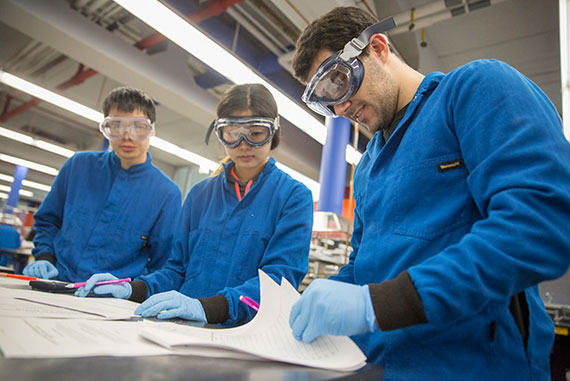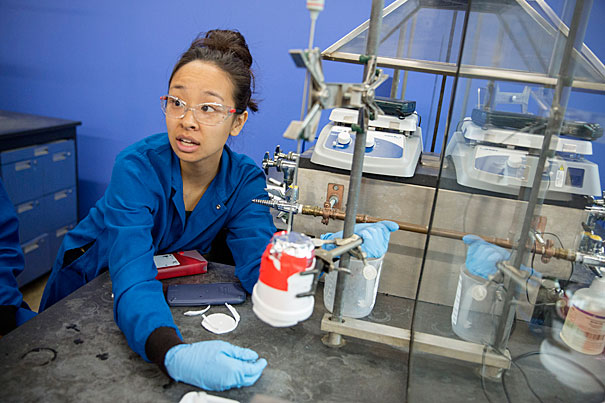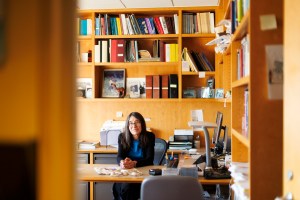
Undergraduates Anumita Das ’16 (from left), Similou Akintorin ’16, and Terilyn Chen ’16 and teaching fellow David Wu test the effectiveness of biodiesel made from used vegetable oil from Annenberg Hall.
Kris Snibbe/Harvard Staff Photographer
Biodiesel one slick solution, but more to come
Students, faculty turn Harvard into a ‘living lab,’ putting sustainability to the test
Teams of undergraduate students huddled quietly around the gray metal desks in the teaching labs at Harvard’s Science Center. Each group was creating a calorimeter out of a used soda can and scavenged Styrofoam cups to determine the energy density and efficiency of the biodiesel they had extracted the week before from waste fryer oil provided by Annenberg Dining Hall.
The students’ research factors into both scholarship and institutional action as Harvard works to generate solutions to the challenge of climate change. They have joined the ranks of Harvard Kennedy School faculty member James Stock, who received one of the first Climate Change Solutions Fund grants for his research investigating market impediments to biofuels penetration. Institutionally, the students are looking at the University’s 2004 decision to fuel its shuttles with biodiesel, which emerged as an alternative fuel source for vehicles because it creates fewer greenhouse gas emissions and reduces pollution.
“The biodiesel lesson definitely personalized the manner in which we utilize energy here on campus,” said Victor Agbafe ’19. “In many instances, when we are thinking about how Harvard as an institution is trying its best to set new trends in saving energy, it can be abstract, and we can’t often observe tangible examples of how this is implemented on a daily basis.”
Students involved in the teaching lab’s biodiesel experiment said the work has given them new perspectives on the larger local, regional, and global issues of energy and sustainability.
The story of how waste vegetable oil from Harvard’s freshman dining hall ended up being used in one of the College’s most popular chemistry classes began as a collaboration between the Office for Sustainability’s (OFS) FAS Green Program and Sirinya Matchacheep, Ph.D. ’07, the director of instructional programs in the Department of Chemistry and Chemical Biology. Matchacheep, an active OFS Green Team member, wanted to incorporate lessons from the campus commitment to sustainability into the curriculum of the teaching labs classes she facilitates. She partnered with sustainability coordinator Anthony Michetti to identify several creative ways to do just that for the nearly 400 students taking the Chemistry Department’s entry-level PS1 and PS11 classes.


Sarah Gonzalez ’18 (center) and Jessica Kim ’18 (right) participate in the experiment. Chen explains the students’ findings.
Kris Snibbe/Harvard Staff Photographer
“Energy and sustainability are both interesting and relevant,” said Matchacheep. “By incorporating these topics and real-world examples from the campus into our classroom, students can walk out of the lab and understand what is being talked about in the news, and have the tools to make informed decisions.”
Students heard directly from Michetti about Harvard’s Sustainability Plan and the goal set in 2008 to reduce greenhouse gas emissions by 30 percent by 2016. They learned how blackberries and raspberries used as part of a solar cell lab were composted, providing additional insight into waste reduction efforts across campus. Tours of the University’s Blackstone Steam Plant and chilled-water facilities gave a hands-on demonstration of energy systems and the chemistry of the heating and cooling cycle.
Harvard’s faculty and students are increasingly using the campus and surrounding community as living laboratories for understanding the multifaceted problems posed by global climate change and sustainable development. In the past year, the Office for Sustainability has increased resources and attention to facilitate a greater number of these projects to provide valuable experiential learning opportunities and inform the work being done on campus to reduce energy and enhance well-being.
“Previously, I wasn’t very familiar with how what we usually consider waste on campus can be used for sustainable purposes,” said Jesper Ke ’19. “Participating in this lab and hearing directly from those at Harvard working on sustainability has made me more mindful of the role that we students can also play in helping with these efforts.”





